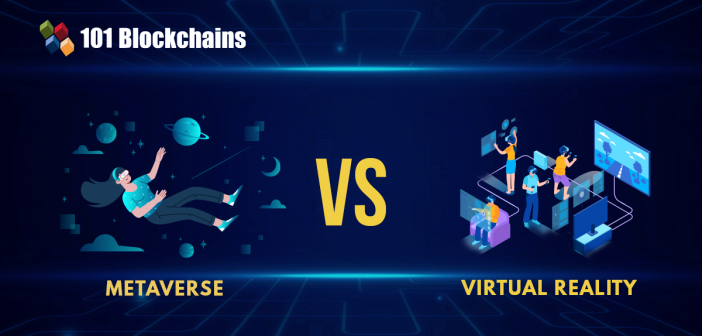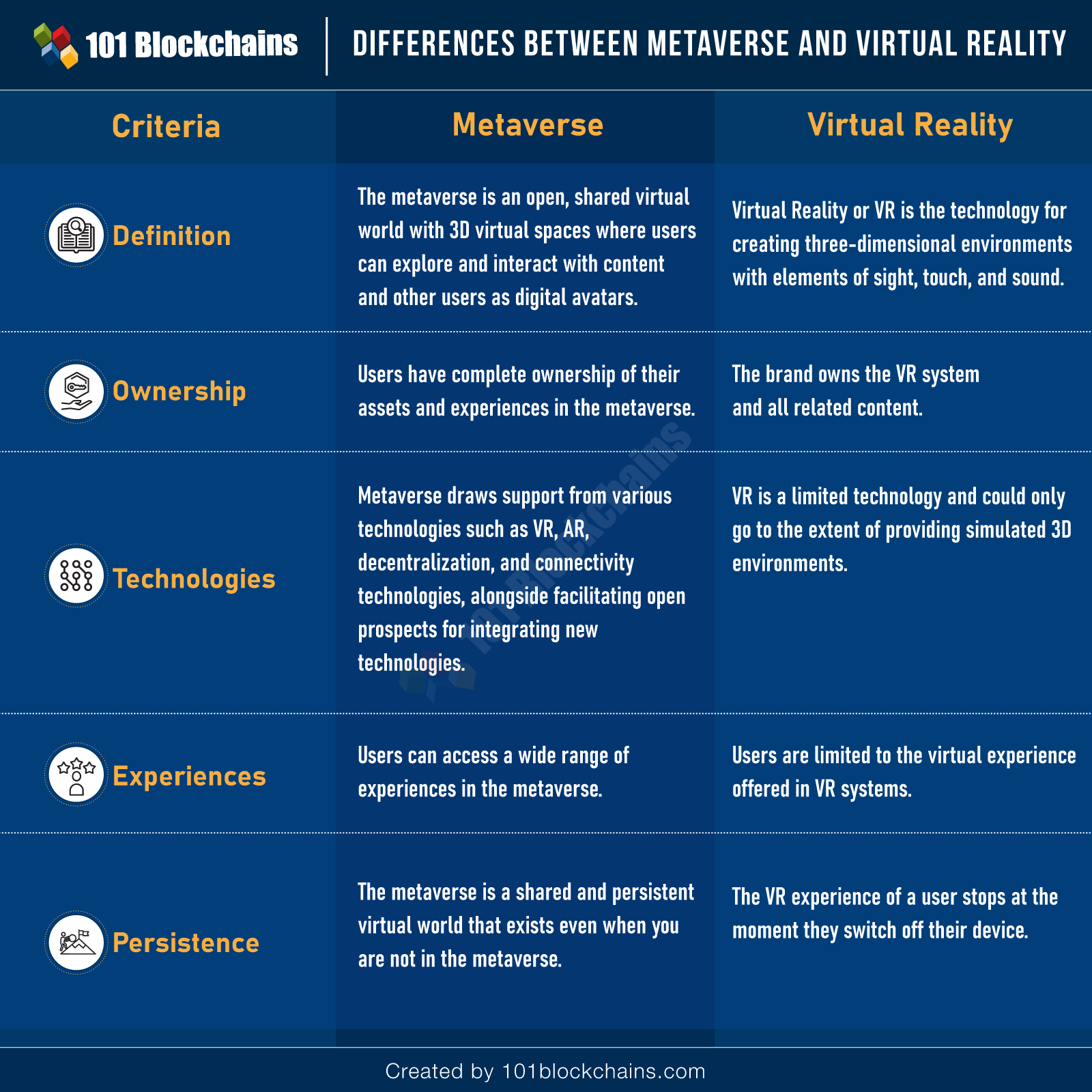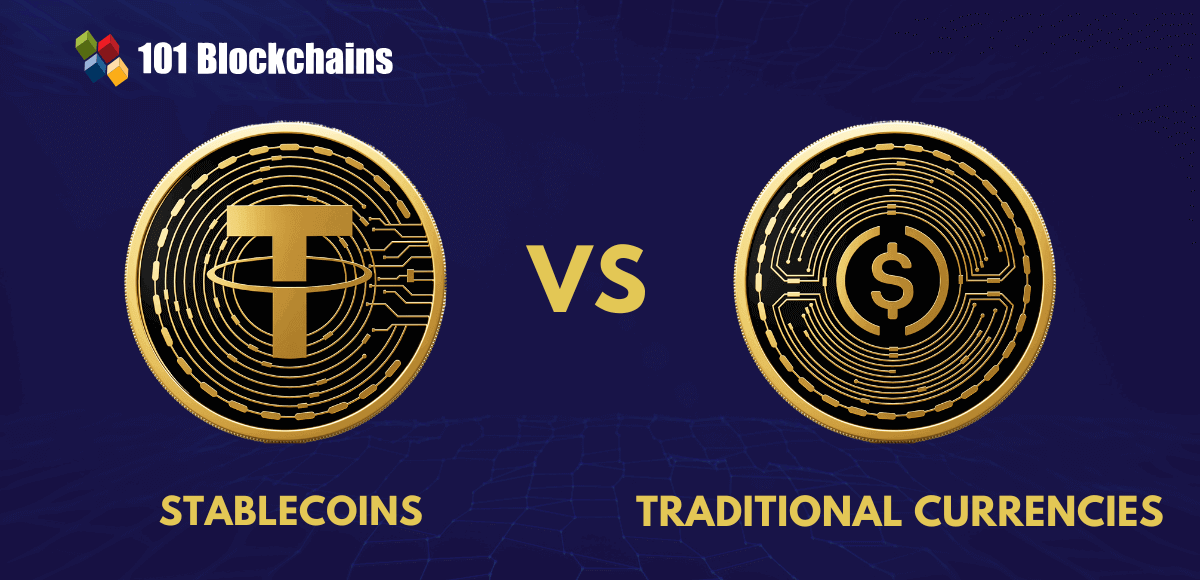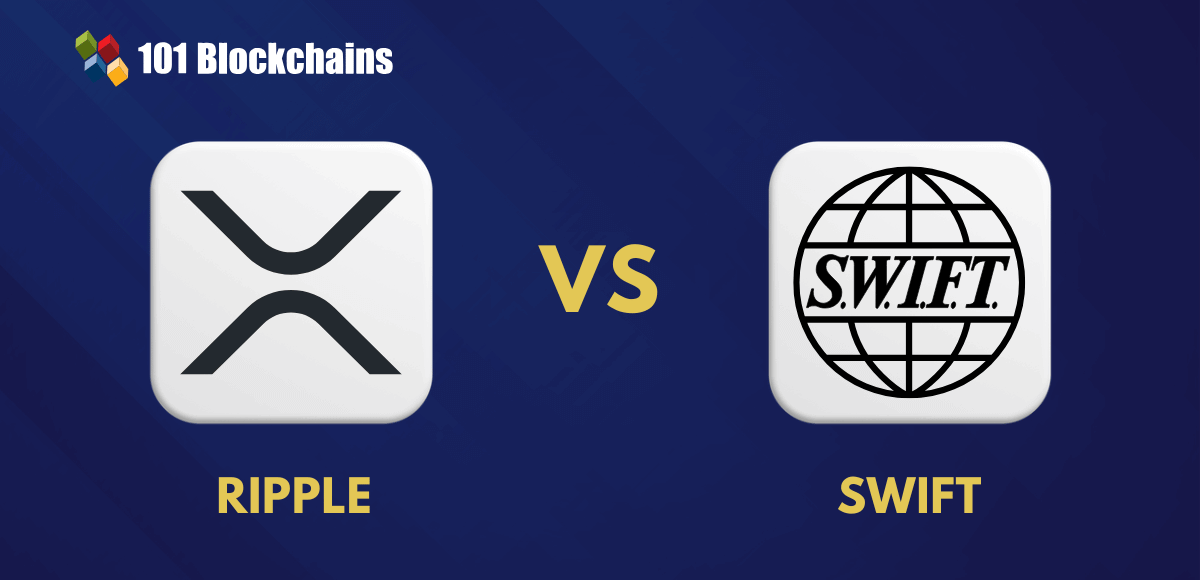Learn how blockchain truly works, master key definitions, and uncover what makes smart contracts so "smart." Dive into the fundamentals, gain valuable insights, and start your blockchain journey today!

- Comparisons
James Howell
- on March 04, 2022
Metaverse vs. Virtual Reality: Key Differences
Many works of science fiction have shown us glimpses of virtual worlds, where people could assume any identity they want. The concept of a digital world, where you can escape from the real world, is definitely one of the fascinating topics in modern technology. Of late, you must have heard a lot about the new developments regarding the metaverse. On the other hand, the deep-rooted association of metaverse with VR technology has been creating buzz around metaverse vs. virtual reality comparisons.
People who are new to the concept would assume that the metaverse is basically a virtual world you can access through VR headsets. Is metaverse the same thing as virtual reality? No. There is a lot you can find for differentiating the metaverse from virtual reality. The following discussion helps you identify the difference between metaverse and virtual reality with a detailed overview of both technologies.
Aspiring to Become a Certified Metaverse Expert? Enroll in Certified Metaverse Professional (CMP) Certification Course Now!
Why Is There So Much Hype around Metaverse and VR?
The metaverse turned into one of the hottest topics of discussion in the tech space, especially after big companies started investing in it. Facebook, Microsoft, Google, Sony, and many other giants are diving into the metaverse with their unique platforms. The concept of metaverse gained prominence only after the announcement of Facebook rebranding to Meta in October 2021. Why did Facebook take such a step?
Interestingly, the announcement at a milestone by the company in selling 10 million Oculus VR headsets brings a lot of attention to virtual reality vs. metaverse comparisons. Well, many descriptions of the metaverse often paint it as something like using the internet in virtual environments. However, virtual reality would serve only as one of the components for interacting with the metaverse. Let us learn more about the metaverse and virtual reality to discover the best way to differentiate them.
Understanding the Metaverse
The first thing you need in a metaverse vs. VR debate is a detailed understanding of metaverse and VR. Metaverse is a concept that dates back to 1992, when a sci-fi novel author, Neal Stephenson, coined it in his novel ‘Snow Crash.’ In the novel, Stephenson describes the metaverse as a virtual world where the protagonist could escape from the real world.
The protagonist assumed a new avatar, completely different from his real life, and explored the metaverse. Years later, most of the definitions of metaverse draw parallel with the concept shown by Neal Stephenson. One of the common definitions of the metaverse paints it as the next stage in the evolution of internet technologies.
The metaverse is like an open and shared virtual world that allows users to explore and interact with different types of virtual spaces, content, and services in three-dimensional spaces. Interestingly, the metaverse empowers different users for developing virtual spaces and solutions, thereby establishing a creator economy.
Users can access the metaverse through VR and many other technologies such as AR glasses. You can also use your personal computer or smartphone to access the metaverse. Therefore, you can notice the answer for “what is the difference between metaverse and virtual reality” from clarity on the fact that VR is not the metaverse.
Want to get an in-depth understanding of metaverse concepts? Join Yearly/Yearly+ Plan and get free access to Metaverse Fundamentals Course Now!
Aren’t Virtual Worlds Supposed to Be the Metaverse?
Well, you would surely have such doubts when you are reflecting on possible differences in the metaverse vs. virtual reality debate. The metaverse is not just any single virtual world you experience with VR technology. On the contrary, it will be a shared and persistent virtual world complementing the real world. A deeper reflection into how the concept of metaverse differs from today’s internet can provide some vital answers to the question.
In the metaverse, you would not be just a device requesting information from web servers. Metaverse users can access online content and the virtual spaces as a person in the form of digital avatars. Users can participate in various experiences in the metaverse as a virtual avatar, which resides in the virtual space. The metaverse would actually serve as a massive, shared virtual world where users don’t have any restrictions. For example, you don’t have to log out of a game to visit a virtual museum in the metaverse.
Learn the core concepts of Metaverse through Metaverse flashcards to extend your knowledge and get ahead of the crowd!
What is Virtual Reality?
Virtual Reality or VR, as the name implies, points out towards the creation of virtual environments driven by technology. From a technical perspective, virtual reality refers to a three-dimensional environment generated by computers. An individual could explore the virtual reality experience and interact with it in an immersive and engaging environment.
Users are immersed in the environments and can manipulate the objects or carry out different tasks in the VR environments. The definition of VR obviously blurs the line of difference between metaverse and virtual reality to an extent. However, it is important to understand that VR can offer access only to walled experiences or restricted virtual worlds.
A person could enter specific VR experiences by using special headsets and glasses associated with the system running the programs. The specialized devices help in elevating the immersive experiences of users with sensory elements in the virtual world, such as sight and sound.
In addition, you can also discover specific VR systems which enable users to wear gloves with electronic sensors. As of now, the major applications of VR have been identified in entertainment. On the other hand, the uses of virtual reality in education, as well as medical and military applications, have also started gaining momentum recently.
What is The Difference between Metaverse and Virtual Reality?

Please include attribution to 101blockchains.com with this graphic. <a href='https://101blockchains.com/blockchain-infographics/'> <img src='https://101blockchains.com/wp-content/uploads/2022/03/Differences-Between-Metaverse-and-Virtual-Reality.png' alt='Metaverse and Virtual Reality='0' /> </a>
The detailed overview of metaverse and virtual reality provides the basic outline for defining a virtual reality vs. metaverse comparison. Most of the discussions surrounding the metaverse often bring VR into the equation. Therefore, it can be difficult to pass the similarities drawn between metaverse and virtual reality. On the other hand, both of them are considerably different from each other. Here are some of the key differences between metaverse and virtual reality.
-
Definition
The foremost pointer for comparison in a metaverse vs. VR debate would obviously refer to their definition. The metaverse is an open, shared, and persistent virtual world that offers access to the 3D virtual spaces, solutions, and environments created by users. On the other hand, virtual reality is the technology for creating three-dimensional virtual environments with specifically targeted functionalities.
However, it is important to note that there is no clear definition of the metaverse. As a result, VR has an upper hand in terms of definition in a virtual reality vs. metaverse debate. You may wonder why metaverse doesn’t have a clear definition when there is already one right in front of us.
In this case, you should note that there are many definitions of the metaverse. Some definitions of the metaverse present it as an open, shared, and persistent digital world, while some define it as an embodied internet. As a result, you can find only vague descriptions about the metaverse in comparison to the ones about virtual reality.
-
Ownership
The next big point of difference between metaverse and virtual reality would obviously refer to prospects of ownership. When you are using a VR system, you are basically experiencing a system under the ownership of a brand. The content in the VR experiences of the system is under the ownership of the brand. The only thing you have in your possession with VR technology is the equipment.
Metaverse, on the other hand, is a completely different game altogether as it allows ownership of virtual assets and experiences to users. Everything you create and own in the metaverse is yours, whether it is a piece of virtual real estate or an artifact. The metaverse confers the privileges of complete ownership on users.
-
Technologies
Another significant highlight in the metaverse vs. virtual reality debates would draw attention towards the technology limitations. When you take a look at VR, there are certain limitations. You can only create virtual experiences refined further with improvements in the VR systems. In the end, VR would be all about simulations and enjoying virtual adventures.
On the other side of the spectrum, the metaverse does not have any such limitations. The metaverse does not draw its strength only from virtual reality technologies. You can find many other technologies driving the functionalities of the metaverse, such as AR, blockchain, crypto, and connectivity technologies. Most important of all, the metaverse is a massive virtual world that allows the integration of new technologies for offering enhanced functionalities.
Aspiring to Become a Metaverse Developer? Check detailed guide on How To Become Metaverse Developer?
-
Experiences
The way you experience VR and the metaverse are also important pointers for comparison in a metaverse vs. VR debate. In the case of VR, you can feel that you are wearing a headset or a gadget that lets you experience the virtual environment. On top of it, the experiences in VR are limited for a specific amount of people, such as the ones playing the game.
The metaverse gives a virtual universe much similar to the real world by combining the technologies of AR with VR. Therefore, you can experience the virtual worlds just like you are moving around in the real world, albeit as a digital avatar. Most important of all, the experiences in the metaverse are not limited only to specific spaces. The difference between metaverse and virtual reality in terms of the quality of experiences also points to the way metaverse allows players to visit, experience, and connect with other users and different spaces in the metaverse.
Aspiring to Become a Certified NFT Expert? Enroll in Certified NFT Professional (CNFTP) Course Now!
-
Persistence
The next pointer for differentiating between metaverse and virtual reality would refer to persistence. Virtual Reality or VR systems are obviously one of the favorites in a virtual reality vs. metaverse comparison. The metaverse is still under development while you already have VR technologies that let you experience virtual worlds. However, the experiences in VR systems cease the moment you switch off the system.
The metaverse flips the script on VR in terms of persistence as it is a shared and persistent universe. This means that even if you exit the metaverse, your digital avatar would still be in the metaverse. It would run normally with other users engaging and interacting with the metaverse.
Want to become a certified blockchain professional? Enroll Now: Certified Enterprise Blockchain Professional (CEBP)
Conclusion
The final overview of differences in a metaverse vs. virtual reality debate shows that the metaverse is more than VR. Virtual Reality is practically one of the foundation technologies for developing the metaverse. It allows users to access the metaverse. However, VR alone is only limited to certain functionalities.
On the other hand, the metaverse is a massive and gradually developing virtual universe, which would embody a 3D representation of the internet. Just like browsing through different web pages, users can browse through virtual 3D spaces in the metaverse. Most important of all, there is no limit to the possibilities of introducing innovation in the metaverse. Start discovering more about the metaverse and find out how VR complements it.
*Disclaimer: The article should not be taken as, and is not intended to provide any investment advice. Claims made in this article do not constitute investment advice and should not be taken as such. 101 Blockchains shall not be responsible for any loss sustained by any person who relies on this article. Do your own research!





